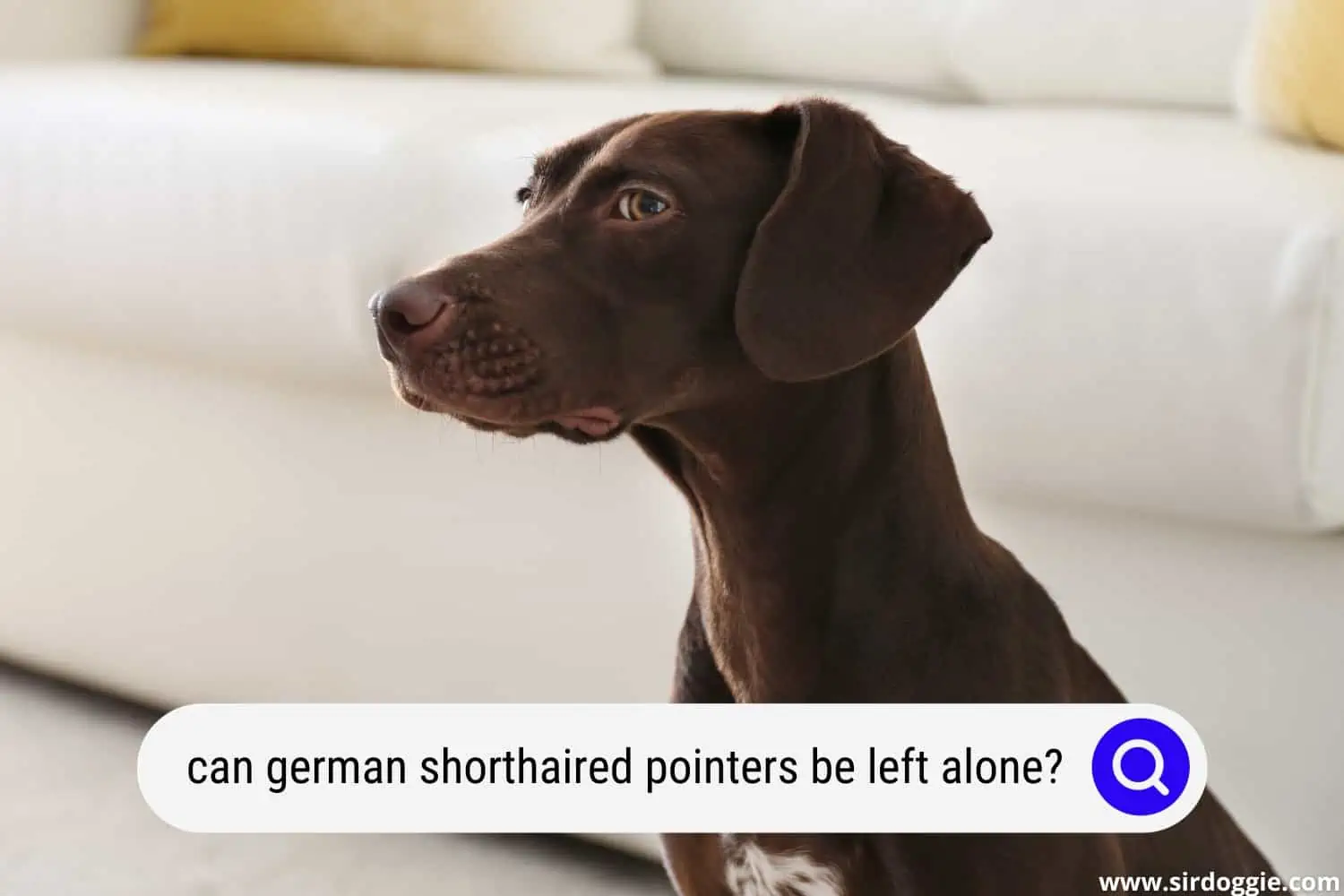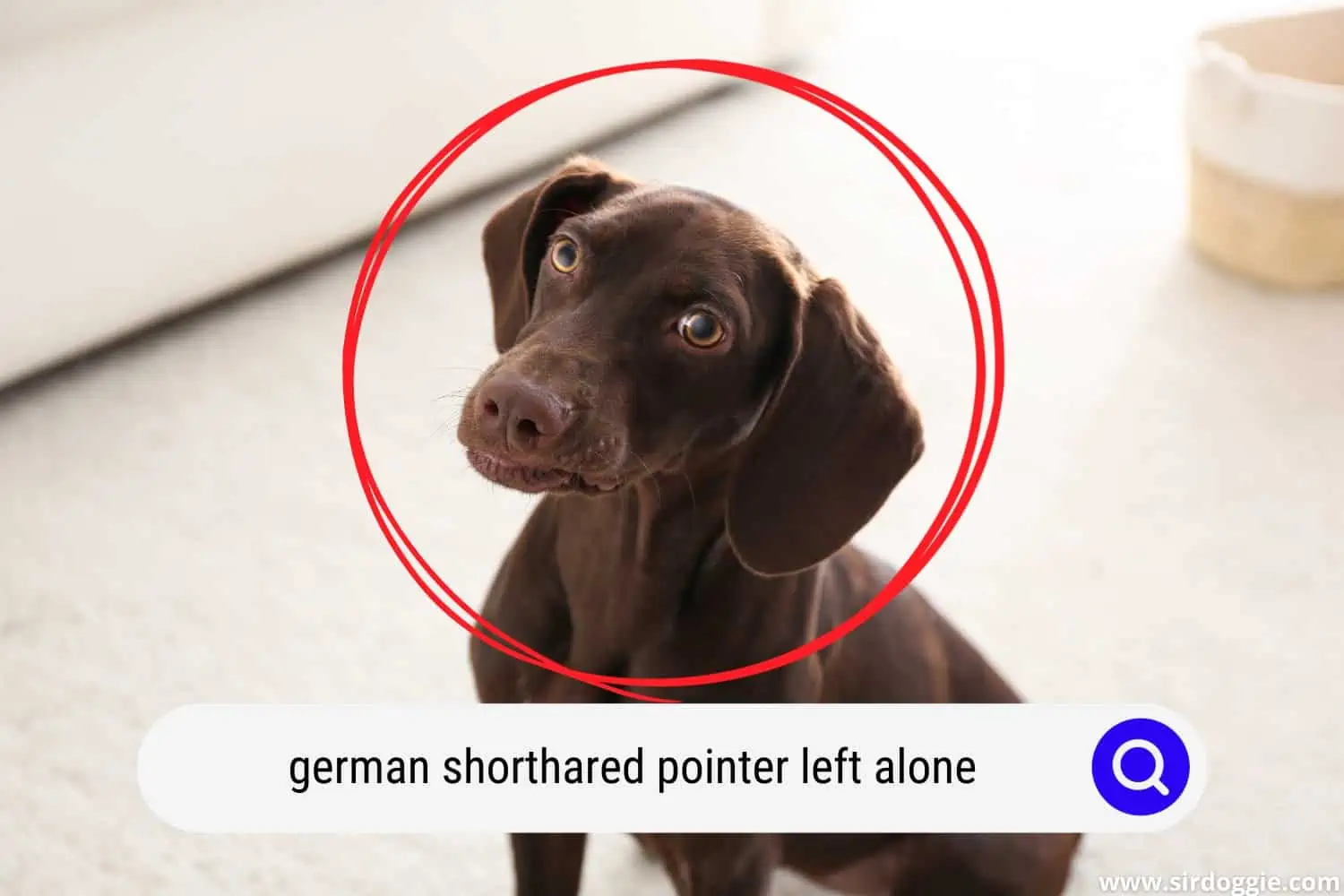Can German Shorthaired Pointers Be Left Alone?
There are many types of pets (dogs, cats, snakes, birds, rodents, etc.) that many people acquire depending on their tastes and interests. Each of them has different characteristics, both physically and emotionally.

As we know, dogs are the most popular pets in most homes on the planet. The characteristics mentioned above stand out much more in this type of animal, which makes them very special to their owners and their human family members.
The most outstanding characteristics of the German Shorthaired pointer can be found in this canine’s emotional aspect. These dogs are affectionate and attached to their loved ones, especially their owners.
They love to spend time with members of their human family, whether it be playing games or receiving training. German Shorthaired pointers can get along well with strangers and other animals, but they need socialization training from puppies.
Importantly, one of the negative aspects of the German Shorthaired pointer is its tendency to suffer from separation anxiety.
That is because they generally begin to feel anxious and sad when they are left alone for a long time, causing them to develop destructive behaviors affecting their emotional state. These dogs need the company of their loved ones (owners and members of their human family) most of the time.
It is essential that a German Shorthaired pointer is acquired by individuals or families who have enough time to spend with it. However, not everyone can dedicate the time that a dog of this type needs.
German Shorthaired Pointers are considered to be excellent family pets, especially because they can get along well with children.
We have mentioned the concept of separation anxiety earlier. It is essential to know about this disorder before you can determine if these types of dogs can be left alone.
What is German Shorthaired Pointer Separation Anxiety?
Separation anxiety is a behavioral problem suffered by some dog breeds when they are left alone at home or separated from their owners for long periods.
In fact, some canines become anxious simply by losing eye contact with their loved ones, although that will depend exclusively on the specific personality of each German Shorthaired pointer.
This disorder affects not only German Shorthaired pointers but also many other breeds of dogs, so it is essential to know the most appropriate measures that we must follow to reduce it.
It is also vital that we know a little about some of the causes that generate separation anxiety in dogs. Some of them have to do with when the canine is left alone at home (or anywhere else) for several hours.
Traumatic situations and experiences can also generate a state of anxiety in German Shorthaired Pointers. Another common cause is the change in family routine which often affects the emotional state of these canines.
Can a German Shorthaired Pointer Really Be Left Home Alone?
German Shorthaired Pointer should not be left alone at home. This breed of animal has separation anxiety and likes to be around its owner. In general, almost no dog should be left alone for more than 3 hours. Dogs also have emotions and want to express them.
They are susceptible animals that can suffer from separation anxiety. It will need a lot of attention from you, so it is not ideal for owners who travel a lot or spend a lot of time away from home.
However, that does not mean that they cannot be trained or treated to reduce this disorder. If you live with several members of your family, you can leave your canine with one of them while you go to work or study.
In the same way, you can ask a neighbor to help you take care of your German Shorthaired while you are away, although this option is not recommended if you work every day.
It is important to note that this breed of dog is very energetic, so it needs to do many exercises every day. These canines need 2 exercise sessions a day, each lasting 1 or 2 hours. That is good for them as it keeps them healthy, and they spend quality time with their human family. If the aforementioned is done, the pet can stay at home for hours alone.
When Can We Leave Our German Shorthaired Pointer Alone?
Unlike other breeds of dogs, we have to bear in mind that the German Shorthaired has a slow maturation process. Most reach this stage in their life by 2 years of age. However, it is essential to clarify a couple of things. During the canine’s first year, it will fully mature physically, and during the second year, it will reach mental maturity.
Therefore, it is not advisable to leave a German Shorthaired home alone during its first two years of age as it can exhibit destructive behaviors. However, the age is not enough to leave this animal alone at home. That is why good training is vital.
A German Shorthaired that is between 2 years and 8 years old can be left home alone as long as it receives enough exercise and training per day, especially if its owners accompany it. In those cases, along with good practice to reduce separation anxiety, your canine will be able to stay home alone for 8 hours or more.
Suppose your canine is over 8 years old. In that case, it is likely that you will need to leave it alone for less time since it will begin to experience certain incontinence and traumatic situations that can affect it emotionally, causing anxiety. That is normal due to aging.
German Shorthaired Pointer Training Process
Following the advice given above, together with training of this type, will help reduce the separation anxiety that your dog presents.
If we want to help our dog in this aspect, we can do it through two types of training:
- Obedience training
- Crate training
Obedience Training to Reduce Separation Anxiety
Teaching your dog the basic commands will allow it to build good habits progressively. That means that it will be difficult to engage in unwanted behaviors outside the range of what you have taught it.
Teach it to sit, stay, or lie down somewhere in the house while you are not with it. You can do that through various commands:
GSP “Sit”
Hold a treat in your hand to get your German Shorthaired’s attention. Move it slowly over its head to make it sit automatically. Quickly say “yes” and reward it with a treat.
GSP “Stay”
Command your dog to sit and then say “stay” so that it does not move from its place. Take a step back and say “yes” and praise it if your dog has stayed in the same place. If not, say “no” in a firm tone of voice and repeat the process until it suits.
You have to teach your dog to be respectful and polite to you, the members of its human family, and even the guests who come to your house. Never pet or praise it when it does something that may be annoying to other people. All this will allow your dog to be more independent and have confidence in itself.
Crate Training to Reduce Separation Anxiety
Place the crate in a suitable place in the house for your German Shorthaired. This space has to be where family members spend time. Also, make sure that the site you choose has perfect temperatures for your German Shorthaired; that is, it should not be so cold but not so hot.
The training consists of accustoming your German Shorthaired to stay inside the crate for short periods and little by little increase that time. Place inside the crate things that make your canine happy such as its favorite toy, a bed or blanket, treats, etc.
Once your dog is used to entering the crate, you can start giving it its favorite foods. That is very important since, as we know, any type of dog loves to eat.
Therefore, if your German Shorthaired eats inside the crate, it will associate it with a pleasant moment and always want to return there. Make sure always to keep the crate door open, so your dog doesn’t lose confidence.
If your dog has already gotten used to eating inside the crate, you can close the door. Every time it finishes eating, open the door, so your German Shorthaired can come out with complete confidence. That will allow it to enter without fear the next time.
Progressively increase the time your pet stays inside the crate. That will allow your German Shorthaired to be protected and confident in the moments when you are not at home.

Things to Avoid When Leaving Your German Shorthaired Alone
When you leave your German Shorthaired alone, you need to consider spending time with it before you go. The absence of the owner causes sadness and anxiety in dogs. So if you leave without saying goodbye, they will feel vulnerable and depressed.
It is recommended that before going to work, you take your German Shorthaired for a long walk, whether on a beach or in a park. It will make the dog feel satisfied and tired, so you can go home with it and leave it there to be able to go quietly to meet your work hours.
Be sure to leave your pet with several toys, a bowl of water, food, and its bed. While waiting, the German Shorthaired will play until it gets tired and can even eat and nap.

Family Dog Expert Author
Hi there! I’m Stuart, a devoted dog lover and family dog expert with over a decade of experience working with our furry companions. My passion for dogs drives me to share my knowledge and expertise, helping families build strong, loving bonds with their four-legged friends. When I’m not writing for SirDoggie, you’ll find me hiking, playing with my beautiful dog, or studying music.